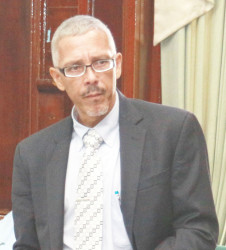While emphasising that government is attempting to create a path for investments and economic growth, Business Minister Dominic Gaskin yesterday reported that the development of industrial estates at Lethem and Belvedere, which had been languishing, would be completed to create at least 1,500 jobs by year end.
Gaskin, who was the first government speaker at the start of the budget debate yesterday, said that this year’s proposed $230 billion budget provides financial resources to enable his ministry to strategically achieve the goals sets for contributing to the improvement of the Guyana economy.

According to the minister, the government’s ability to bring two budgets within months of each other demonstrates a capacity to govern, which will give confidence to investors contemplating the Guyanese economy.
He said that “investor confidence” is critical as it is needed for an economy to grow and develop.
“Fortunately, that confidence is growing because we now have a government that understands this and is signalling to investors that Guyana is a clean, wholesome and profitable place to do business,” he said.
Gaskin told the House that Minister Winston Jordan should be commended for his budget, particularly his measures to improve tax administration. This, he opined, will result in businesses taking their tax obligation more seriously and making more valuable contributions to the economy.
He said that the proposed budget has raised the bar for effective public spending.
He also said that while the PPP/C was in government for 23 years it never saw it fit to release any reliable statistics on unemployment. He said that the unemployment rate had been “a state secret” for the last 23 years.
“In fact it is doubtful that there is even a methodology in place to measure the rate of unemployment in Guyana,” he said, while assuring that government will make the necessary investments in the development of the Bureau of Statistics so that Guyanese can regularly know what the unemployment rate is.
Gaskin said that the 2016 budget projects tax revenues of $150 billion and other current revenues of $23 billion, which leaves a deficit of 4.7% of the country’s Gross Domestic Product. He said that the tax revenues depend heavily on private sector investments and in this regards the work of ministers and agencies, which support private enterprise, is important for economic well-being and therefore require proper funding.
Speaking about industrial projects for this year, he said that the $212 million allocated for developing and fixing industrial estates will go a long way towards creating jobs. He cited two sites—at Lethem, Region Nine, which after completion will accommodate at least 100 businesses and at Belvedere, Region Six, which has space for about 20 business.
He informed that these two projects have been “languishing in the pipelines” for over a decade. He assured that government will complete them so that appropriate work space can be provided for investors in value-added industries, who have the potential to export and rake in foreign earnings for the economy.
He said that once they are completed, the ministry will assume responsibility for the estates and the management will become a priority so that they are sustainable over the long term and are beneficial to the economy.
According to Gaskin, the terms and condition of leases for estates will be looked at. “Our government will regularise the use of these sites and ensure future allocations of space is made in a transparent and fair manner,” he said to applause.
The utilising of lands for value-added economic activities, he said, is critical to the expansion of secondary productive and employment opportunities. He pointed out that it is estimated that by year end those industrial estates would have created 1,500 jobs, which is a figure that is expected to rise with higher occupancy levels.
Gaskin also informed that projects that were started in 2014 under the Rural Enterprises Development will be completed. According to Gaskin, they initially comprised the construction of two call centres at Tuschen and Enmore, and two chip factories at Wakenaan and Leguan. He informed that government is unable to proceed with the Leguan chip factory, which was built on land prone to flooding and erosion. “The building in Leguan was constructed with no consideration for how either a person or a plantain could get from the main roadway into the factory when it became operational,” he noted.
Gaskin said that it will, therefore, require an additional contract for a road and a bridge to gain access to the premises and this will be completed by government so that by the end of the first half of the year the factory can be operational and provide some benefit for the community.
The money set aside in the budget, he added, will allow for the completion of the projects by June this year.
He said that the Sophia Exhibition Complex is in urgent need of an upgrade and the $55 million set aside for this will provide a new stage, a trestle, drains and an almost brand new building, which will be ready for use for the 2016 GuyExpo. He said that the site can also become a revenue earner for government.
Standards, he added, are important tools in business development and therefore the Bureau of Standards will need to build a strong partnership with the private sector in order to provide relevant standards for expanding business.
He spoke too of small businesses needing to have access to credit as well as business training. The Small Business Bureau, he noted, will be playing a greater role than it did in the past. Gaskin also spoke of plans to transform Go-Invest into a high performing investment promotion agency.





